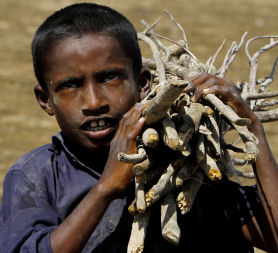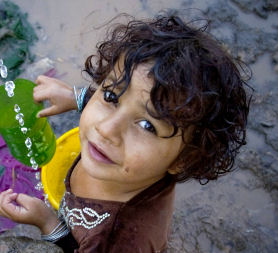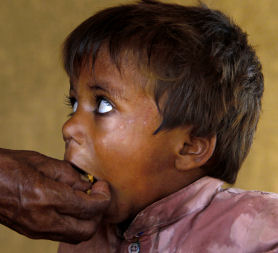Pakistan floods: a forgotten emergency
As winter arrives in Pakistan one international charity tells Channel 4 News the recent flooding is in danger of becoming a forgotten emergency.

The north of Pakistan will soon be in the grip of sub zero temperatures.
Millions of people made homeless by the Pakistan floods are still sleeping on damp ground with little more than plastic sheeting for shelter.
An area roughly the size of England has been affected by the disaster and charities say the arrival of winter means it will only get worse.
They warn this catastrophe is in danger of becoming a forgotten emergency.
Mohammed Qazilbash is Save the Children’s country director in Pakistan. He told Channel 4 News essential supplies are still scarce: “There aren’t enough materials to protect people, especially in the north of the country where it gets very cold. Children will suffer tremendously.
“In the south where evening temperatures are still quite low, about 6 Celsius, if children don’t have the right bedding and clothing they could catch pneumonia.
“Children there already have compromised immune systems so the fluctuation in temperatures mean the pneumonia will be much more severe.”

Food shortage
As well as being homeless many families are struggling to feed themselves following the Pakistan floods.
There are fears that a harsh winter will make it more difficult to get food to remote communities.
Many of the country’s rural roads are in a poor state so transporting supplies can be a challenge in the best of weather.
Children are suffering in silence. They can’t go to the front of the food line and demand supplies. Mohammed Qazilbash, Save the Children
For communities in the south of the country the problem is access to firewood.
The ground is still damp so heating wood for cooking is difficult.
Mohammed Qazilbash said the vulnerable will struggle most as temperatures fall: “Twenty per cent of the affected population are children. They’re suffering in silence. They can’t go to the front of the food line and demand supplies.
“Children are dependent on assistance from the international community and if assistance is not provided then I’m afraid the situation will only get worse.”
Save the Children says the specific nutritional needs of babies mean they are even more at risk: “Their needs are not being met.
“There is a significant and potentially alarming gap in the nutritional needs of children.”
Charities in Pakistan have set up centres where people can take young children to be fed but many families can’t afford the cost of transport.

Swat Valley
For up to 1.7m people, facing winter without shelter is a familiar experience.
They were displaced from their homes in 2009 after violent fighting with the Taliban in Swat Valley.
The devastating floods have reversed much of the progress which had been made.
Channel 4 News travelled to the region in October.
We found schools in the village of Badali which had been blown up by the Taliban. Teachers had been able to resume classes among the rubble but the floods ruined any remaining infrastructure.
Mohammed Qazilbash said the situation facing those displaced by the fighting was grave: “It is most unfortunate that enough assistance hasn’t been made available so they can return to a level of normality.
“It’s their second year of displacement and their frustration is rising.”
International assistance
There are fears that as time passes the plight of people following the Pakistan floods will fade from memory.
The response from the British public and the British Government has been widely praised, but charities say there is still a lot of work to be done, especially as winter sets in.
As Pakistan disappears from the headlines Mohammed Qazilbash says people shouldn’t forget the scale of the disaster: “This must not become a forgotten emergency. It’s definitely getting to the stage of a forgotten emergency.
“Fifty days ago it was all over the news networks but here (in Pakistan) it’s lost its currency and reports on the needs and crisis in communities is no longer making the headlines.”